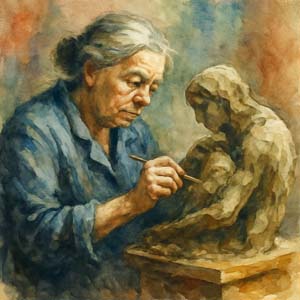— Kathe Kollwitz
 With art that honored humanity, German printmaker and sculptor Käthe Kollwitz (1867–1945) was born on this day in Königsberg, Prussia (now Kaliningrad, Russia). The daughter of a compassionate mason, her gift for drawing was nurtured from a young age.
With art that honored humanity, German printmaker and sculptor Käthe Kollwitz (1867–1945) was born on this day in Königsberg, Prussia (now Kaliningrad, Russia). The daughter of a compassionate mason, her gift for drawing was nurtured from a young age.
“From my childhood on, my father had expressly wished me to be trained for a career as an artist,” she explained. “He was sure there would be no great obstacles to my becoming one.”
Educated in Berlin and inspired by Max Klinger and Emile Zola, Kollwitz created self-portraits and scenes of hardship—stark, poetic, and emotionally raw. She called her work a form of “reporting art.”
After the death of her son Peter in World War I, she began the memorial The Grieving Parents, a solemn tribute to all who mourn the losses of war. “There has been enough of dying! Let not another man fall,” she wrote.
Persecuted by the Nazis in 1936, Kollwitz spent her final years in quiet isolation, yet remained devoted to the satisfaction of creation. “For the last third of life there remains only work. It alone is always stimulating, rejuvenating, exciting, and satisfying.”
Kollwitz cultivated each seed of inspiration with fierce compassion, quiet reverence, and unwavering truth.
 Live, create, celebrate life!
Live, create, celebrate life!
